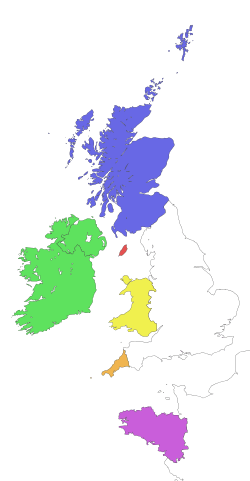Celtic Congress
The International Celtic Congress (Breton: Ar C'hendalc'h Keltiek, Cornish: An Guntelles Keltek, Manx: Yn Cohaglym Celtiagh, Scottish Gaelic: A' Chòmhdhail Cheilteach, Irish: An Chomhdháil Cheilteach, Welsh: Y Gyngres Geltaidd) is a cultural organisation that seeks to promote the Celtic languages of Ireland, Scotland, Wales, Brittany, Cornwall and the Isle of Man. The International Celtic Congress is a non-political charitable organisation and its stated object is to "... perpetuate the culture, ideals, and languages of the Celtic peoples, and to maintain an intellectual contact and close cooperation between the respective Celtic communities."
The Celtic Congress should not be confused with the Celtic League which also focuses on political matters, although the two organisations share a number of objectives. Like the Celtic League, it tries to "hold... an annual international congress in one of the six Celtic countries, if possible according to a fixed rotation". The Celtic League itself, split off the Celtic Congress amicably, to pursue political aims, and many people are members of both.
There is an International Celtic Congress each year in one of the Celtic countries. The 2015 Congress is scheduled for Rosscarbery, Ireland; in 2016, the Isle of Man.
Background
Following a meeting at the National Eisteddfod of Wales in 1900, the first Pan-Celtic Congress was held in Dublin in 1901, at that time it was proposed to make the Congress a triennial event.[1] In 1904 Cornwall became a member of the Pan-Celtic Congress.
History
In 1917 The Celtic Congress was formed from the merger of the Celtic Association and the Pan-Celtic Congress having its first meeting in 1917 at Birkenhead Eisteddfod.[2] The Congress was held in Edinburgh in 1920, and in 1921 on the Isle of Man. In 1925 the Congress was held in Dublin, where one of the speakers was Douglas Hyde.
In 1935, Cardiff was the venue, and BBC Western Region broadcast the proceedings. The 1938 Congress was held on Isle of Man in different halls, so that attendees had a choice of lectures, debates and discussions.[2] Meetings were irregular before World War II although in the 1920s, the National Party of Scotland (the forerunner of the modern Scottish National Party) sought involvement, and the then Taoiseach of Ireland, Éamon de Valera consented to be a patron of the organisation in the 1930s.
There had been an eleven-year gap before the August 1949 Celtic Congress at Bangor, Wales where delegates included Sir Ifor Williams and Conor Maguire, Chief Justice of Ireland.[3] Meetings have been held almost every year since then. The Wales branch hosted the meeting at Aberystwyth in 1960.[2]
Each of the six branches is independent with their own programmes of activities during the year. The Conference is held in each of the six countries in turn, and the country that is hosting the conference has the privilege of choosing the theme of the lectures for that year. An International Celtic Congress involves lectures, visits to places of cultural and historic interest, and music and dance events.
See also
References
- ↑ Lord Castletown. "Address to the Pan-Celtic Congress of 1907", Scotia, St. Andrew's society, 1907
- 1 2 3 Ellis, Mari. "A short history of the Celtic Congress", Proceedings of the Aberystwyth Congress, 1983
- ↑ The Manchester Guardian CELTIC CONGRESS AT BANGOR: First for Eleven Years; 9 August 1949
External links
- Celtic Conference and Festival Cardiff 11-16 August 2014
- Celtic Congress Website
- John, Edward T., "Address delivered at the Edinburgh Celtic Conference", May 24, 1920
